Retina MacBook Pro’s “Gold Standard” Rating Renders EPEAT “Green” Certification Meaningless
Last June, iFixit called the new 15-inch MacBook Pro with Retina display “the least repairable, least recyclable computer [yet] encountered in more than a decade of disassembling electronics,” what with super-strong glue fastening the battery to the chassis, hard-soldered memory, a proprietary SSD hardware interface and proprietary screws fastening it closed making it virtually impossible to repair, replace, or upgrade the laptop’s battery, upgrade RAM, and so forth.
That’s why Apple voluntarily withdrew its products from eco-friendly consumer electronics EPEAT standard last summer, then did U-turn after a public outcry, even though the Retina MacBook Pro remains distinctly un-green – a clear case of what iFixIt CEO Kyle Weins calls
“greenwashing.”
In a caustic essay, Weins fulminates that giving the Retina MacBook Pro an EPEAT “Gold” certification renders the EPEAT supposed standard essentially a bad joke, or at best, the interpretation of the EPEAT Gold standard laughably out of touch, for example claiming that Apple’s proprietary Pentalobe screwdrivers are ‘commonly available tools’ and deeming a USB thumb drive to constitute an ‘upgrade.’ At worst, he says, it may mean that recyclers a decade from now will be confronted with a mountain of electronic waste they can’t affordably recycle without custom disassembly fixtures and secret manufacturer information.
Weins observes that the social and environmental price of manufacturing electronics is high, so it’s critical that products last as long as possible, but Apple’s products emphatically are not green thanks to its trending toward glued-together, essentially throwaway products with batteries that may fail after 12-24 months, and hardware designs that make repair so difficult that people rarely replace the batteries, opting instead to buy a replacement device.
Weins notes that taken aback bythe degree of public outrage over its EPEAT pullout, it reversed the decision and publicly apologized, but of course changed nothing about the Retina MacBook Pro design, which falls miserably short of three EPEAT supposed standards:
• “Product shall be upgradeable with commonly available tools.”
• “External enclosures shall be easily removable by one person alone with commonly available tools. Hard disk, digital versatile disc (DVD), floppy drive can be changed or extended. Memory and cards can be changed or extended.”
• “Circuit boards >10 square cm (measured on the largest face), batteries, and other components—any of which contain hazardous materials—shall be safely and easily identifiable and removable.”
As Kyle Weins observes, reasonable assessment would deem that a product assembled with proprietary screws, glued-in hazardous batteries, non-upgradeable memory and storage, and several large, difficult-to-remove circuit boards would fail all three tests.
So a fudge was in, altering and watering-down interpretation of the standard to allow Apple’s flagship laptop to clear the much-powered bar, and rendering EPEAT certification virtually meaningless.
Where is the public outrage about that? Are consumers really so dense and gullible as to accept that what EPEAT has done really “fixes” anything, or are so-called “green” standards just an exercise in feel-good?
You can read Kyle Weins’s report and analysis here:
http://goo.gl/MUUVk
